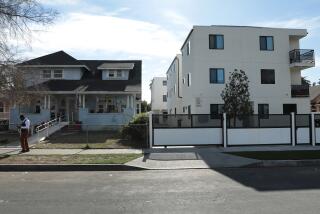‘Redlining’ Causes Rundown Neighborhoods, Not Other Way Around; Lenders Share Blame
- Share via
I was very disappointed by the definition of “redlining” in the article “Group Accuses American Savings of ‘Redlining’ ” (Jan. 3). It was defined as “the refusal to make loans in a particular neighborhood solely because of deteriorating conditions.”
The practice uses racial criteria to deny loans in certain areas. Redlining leads to deteriorating conditions in urban minority neighborhoods, not vice versa, as the article states.
Lenders have a longstanding policy of equating minority homeowners with bad financial risks and equating minority in-migration as indicative of a neighborhood in decline. This kind of stereotyping is one of the major causes of urban decay.
Since about 1936, the Federal Housing Administration adopted standard banking industry policies that forbade underwriting loans that would allow people of different national origin or race to live in the same neighborhoods. The agency also adopted policies that forbade insurance for mortgages in urban areas defined as having uncertain future value because of their racial composition. These policies were federal law until 1962.
The effect was to bankroll “white flight” to the suburbs during a 20-year period after World War II and to block minorities from obtaining home and small-business loans that would have enabled them to pursue the American dream on an equal footing.
By bankrolling such policies as redlining, and segregated public housing and schools, the federal government enforced the division of American society along racial and economic lines. Ironically, lenders who refuse to invest in housing in a neighborhood are often willing to loan money to a developer to tear down that housing to build an office building.
Many lending institutions in urban areas accept deposits from minorities but deny them loans in favor of highly speculative ventures outside their customers’ communities. Proponents of “greenlining” feel that lenders have a responsibility to reinvest part of that money back into those communities.
SCOTT E. RITTENHOUSE
The writer is an urban planner from Los Angeles .
More to Read
Inside the business of entertainment
The Wide Shot brings you news, analysis and insights on everything from streaming wars to production — and what it all means for the future.
You may occasionally receive promotional content from the Los Angeles Times.









